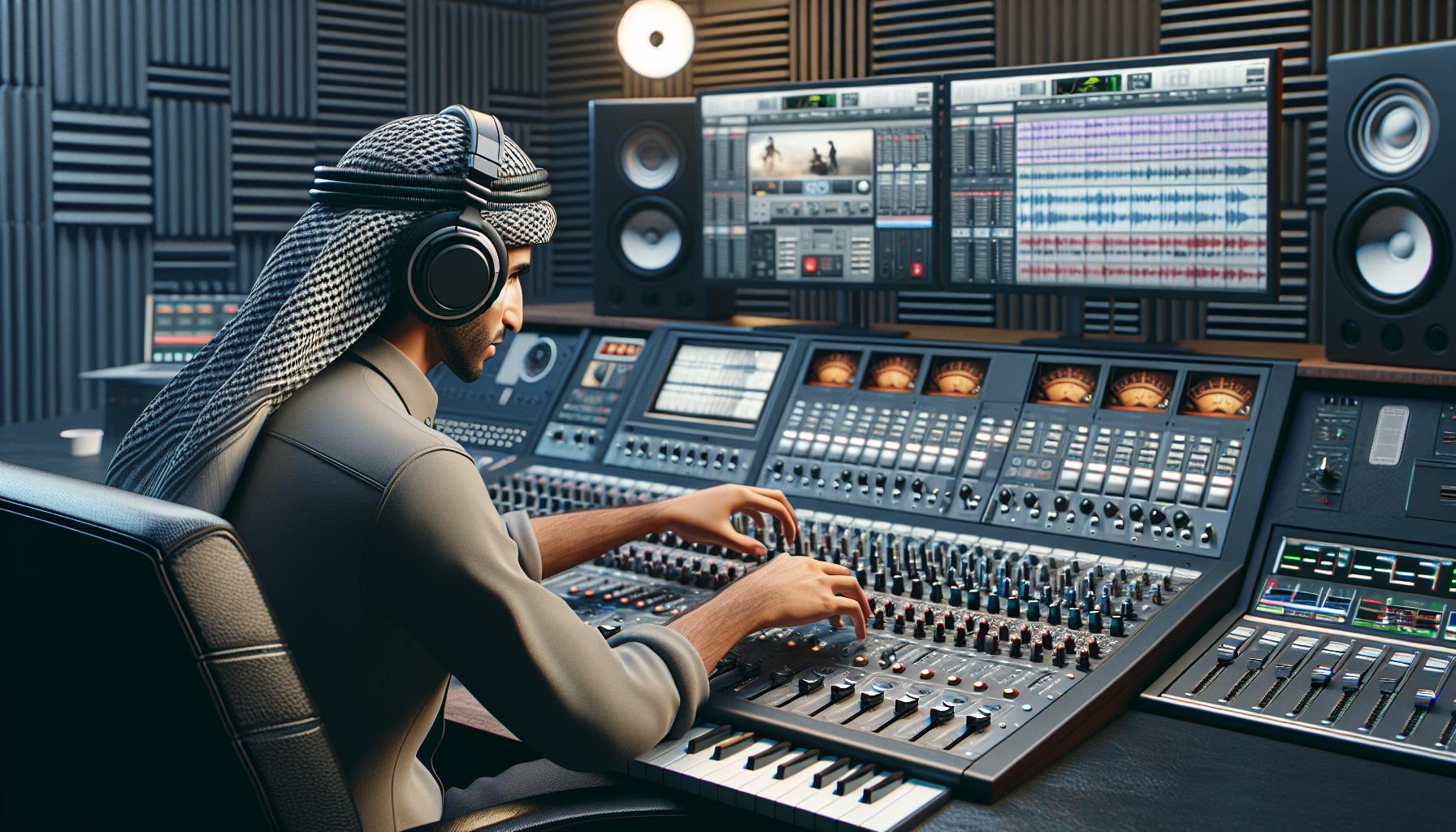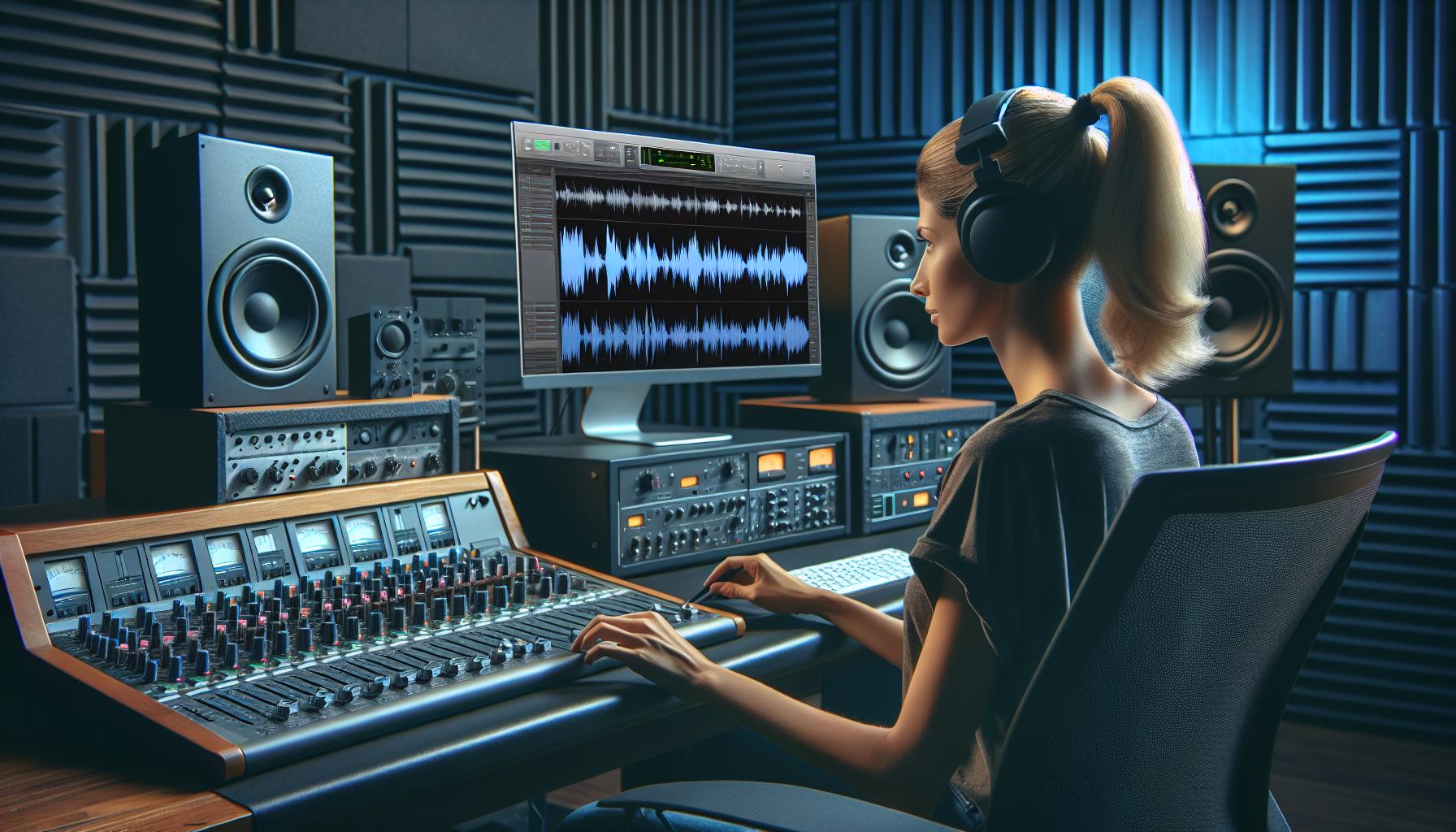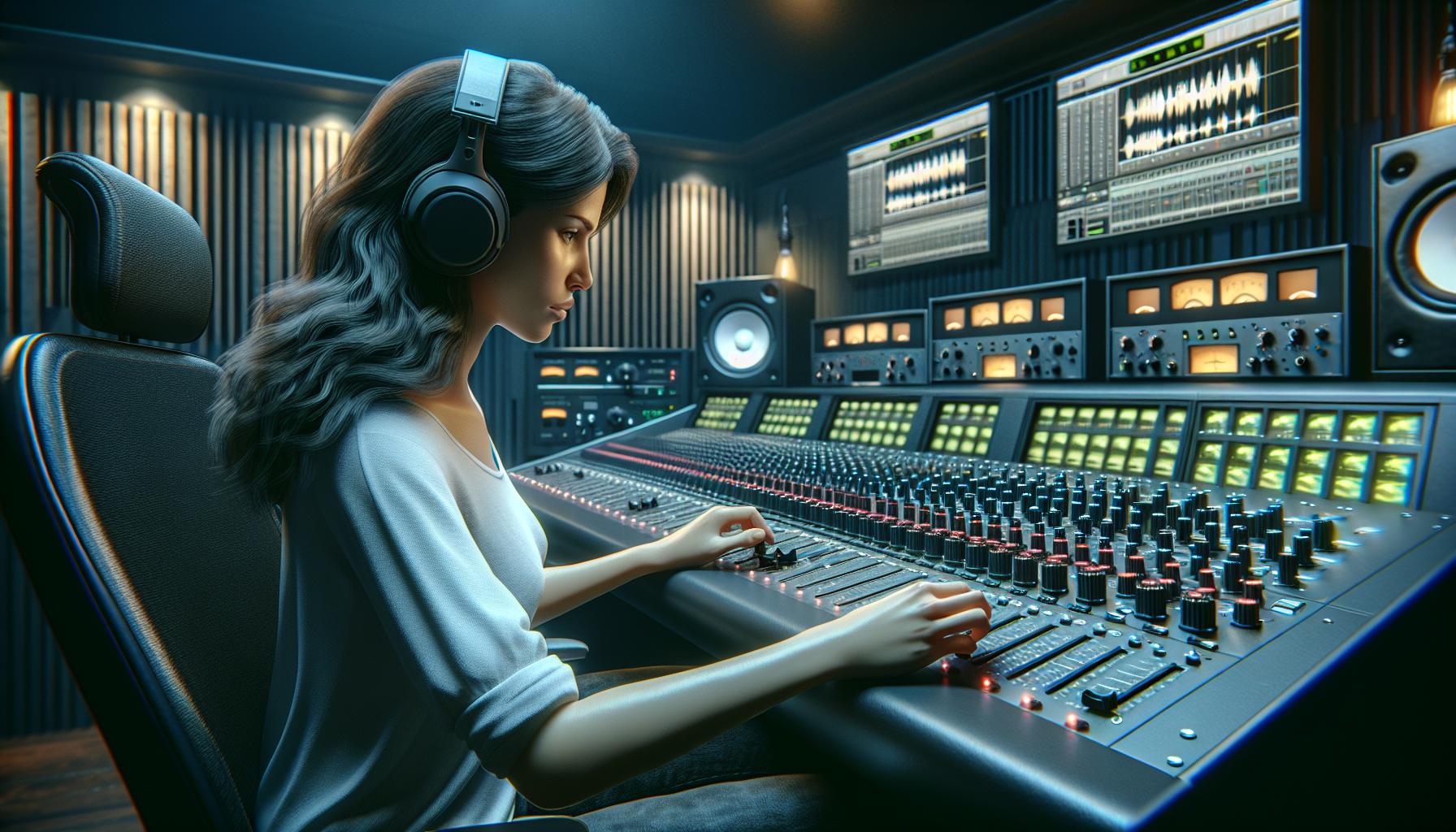In the realm of music production, there’s one step that often gets overlooked, but it’s absolutely crucial – mastering. It’s the final polish that gives your tracks that professional, radio-ready sound. Many aspiring musicians and producers underestimate its importance, but I’m here to tell you, it’s a game-changer.
Mastering isn’t just about making your music louder. It’s about balance, clarity, and consistency across all playback devices. Whether your listeners are using high-end headphones or a cheap pair of earbuds, professional mastering ensures your music sounds its best.
So, if you’re serious about your music, don’t skimp on mastering. It’s the difference between sounding amateurish and sounding like a pro. Stick around as we delve deeper into the art of mastering and why it’s so important.
Contents
What is Mastering?
Often misunderstood, the process of mastering in music production is a pivotal stage to approach with both diligence and respect. It’s not about artificially inflating the volume of a sound recording, and it’s certainly not to be considered an afterthought.
Let’s dive deep into this complex process.
Built upon the core principles of balance, clarity, and consistency, mastering ensures that your tracks play without issue on any given device- from high-end speakers to bargain headphones. It’s a type of audio post-production, but one that serves a critical role.
Mastering uses various techniques like equalization, compression, and limiting to modify the sonic characteristics of a mix. It’s the final polish, the icing on the cake. My primary goal when mastering is to render a piece of music that’s uniform, uninterrupted, and most importantly, pleasurable on every playback device.
What does that mean in practical terms? It means adjusting levels between tracks for a cohesive album experience, fixing minor mix issues, and enhancing the overall sound with equalization and dynamics.
As an integral part of music production, professional mastering is indispensable in achieving a polished, nuanced, and radio-ready sound. It’s what differentiates an amateur recording from a professional one.
When I look at the daunting waveforms of an unmastered track, I see a world of untapped potential. And when that final mastered track comes out sounding perfect every time on every device, that’s when you know you’ve truly mastered the art of mastering. The skill rests not solely in the techniques applied, but also in the nuanced understanding of how to use them. Mastering is a critical step in music production, but it’s one that often gets overlooked.
Through careful attention to detail, a masterful understanding of music, and years of honed experience- I bring transformation to those waveforms, turning sound into music.
The Purpose of Mastering

The process of mastering focuses on bringing balances and coherence to your music. But what does that mean? It’s about shaping the sonic elements of your mix and making it sound as good as humanly possible. This is achieved through effective equalization, compression, and limiting.
Equalization allows us to manipulate and enhance the balance of frequencies in a track. Whether it’s boosting the highs for added crispness or taming unruly low ends, equalization gives your track its unique voice. Then comes compression, a crucial method for controlling the dynamic range of a track. By narrowing the gap between the loudest and softest sounds, you retain the emotional impact without hurting listeners’ ears at peak levels. Finally, there’s limiting, a technique that ensures your track’s loudest parts never exceed a specific level.
Professional mastering involves using these techniques in harmony to craft an immaculate sound. But that’s not all, mastering also ensures consistency in your music regardless of the playback device. Let’s make this clear – when I say “consistency,” I mean that your music will sound equally fabulous whether it’s played on a home stereo, a car radio, or the latest smartphone. That’s the magic of mastering: it ensures your music is universally enjoyable.
In a nutshell, the purpose of mastery extends far beyond just increasing volume or making loud music louder. It’s the difference between a rough diamond and a perfectly cut gem – the mastering process polishes your tracks and brings out their best features. Whether you’re an indie artist releasing your first EP or a well-established band dropping your latest album, professional mastering and its meticulous attention to detail can make a world of difference in expressing your sound to the world.
To illustrate this importance, I’ve put together a simple comparison table. The table illustrates the difference between an unmastered and a professionally mastered track authority and balance.
| State | Bass Authority | Top-End Balance |
|---|---|---|
| Unmastered | Often Lacking | Inconsistent |
| Mastered | Full & Strong | Smooth & Clear |
So, the next time you listen to your favorite song, remember that there’s a master behind that masterpiece guiding your listening experience. This is the subtlety and importance of the mastery process.
The Role of Mastering in the Music Industry

Mastering plays a critical role in the music industry. It’s the final and most crucial step in the sound production process that ensures music tracks have a balanced and coherent sound. Every chord, beat, and lyric is meticulously examined under the skillful hand of a professional mastering engineer. They adjust and perfect each element, ensuring the track resonates beautifully across various playback devices.
Picture a glossy coat of polish on a piece of finely crafted furniture – that’s precisely what mastering does to a raw mix. It polishes the music, enhancing it to shine in its best light. No two tracks are the same, and a one-size-fits-all approach falls flat in this complex process. Each track is a unique blend of rhythms, harmonies, and textures. A seasoned mastering engineer brings out the best in each track, honoring its distinct character.
In no small measure, the rise of streaming services such as Spotify, Apple Music, and Pandora has revolutionized audio consumption. These platforms have diverse sound systems, making it challenging for the songs to retain their quality across devices. This scenario is one place where the importance of mastering is felt acutely. Mastering engineers adjust the tracks, ensuring a memorable listening experience whether the music plays on a small mobile device, in a top-tier recording studio, or a bustling nightclub.
It’s not all about turning up the volume. If that were the case, mastering wouldn’t require such a level of expertise. Mastering involves refining each track to display its best features. Whether it’s a soulful vocal performance, an electrifying guitar solo, or a gripping drum beat, it’s often the unseen efforts of a mastering engineer that makes them resonate with listeners around the world.
Professional mastering is like a meticulous craft. Attention to detail is critical, and a deft hand ensures the artist’s sound is expressed flawlessly to the world. With such high stakes involved, it’s clear why mastering holds a significant position in music production.
Benefits of Professional Mastering
Let’s dive into the manifold benefits of professional mastering. With the right mastering engineer on board, every minute imperfection in your tracks can be identified and rectified. Any discrepancies in frequency balance, resonance, stereo imaging and more can be duly corrected. Professional mastering refines a song and makes it ready to impress in any playback environment.
The first notable perk of professional mastering is its impact on sound clarity. Mastering engineers utilize sophisticated tools to reduce unwanted noise, enhance the desired sound, and deliver a crystal-clear acoustic experience. This ensures that your melodies cut through any ambient noise and resonate stronger with listeners. They’ll be stopping in their tracks at the striking clarity of your sound.
Professional mastering also warrants consistent listening experiences across different audio devices. Be it a high-end stereo system or a simple pair of earphones, your tracks should sound impressive everywhere. Mastering engineers adjust each track’s dynamics and EQ ensuring that every detail of your music is savored, regardless of the listener’s device or location.
Another key benefit is how professional mastering aids in album cohesion. If you’re releasing an EP or an album, it’s essential that the tracks flow smoothly from one to another. Mastering helps in attaining a consistent tonality and volume across the album, fostering a seamless listening experience.
Moreover, in today’s digital age, mastering is even more significant. The rise of streaming platforms has presented different sound systems. From the streaming quality of Spotify to the streaming specifications of Apple Music, your music has to sound its best everywhere. Professional mastering ensures your tracks meet these varied platform specifications, hence optimizing your music for streaming.
The process of mastering is intricate, meticulous, and of undeniable importance in the music industry. The art of mastering demands fine-tuned ears, experience, and mastery over sophisticated audio tools. And that’s exactly what a professional mastering engineer brings to the table. So, while you focus on creating impactful melodies, let the professionals take care of perfecting the sound.
Remember, mastering is not the final step in music production — it’s the final step in capturing the magic you’ve created. It’s about breathing life into every note, making every beat resonate, and ensuring your music unfolds its full potential in the listener’s ears.
How to Choose a Professional Mastering Engineer

Finding the right mastering engineer for your music is quite crucial. As previously discussed, mastering is not just another step in the process, but it’s the final touch that brings the magic to your music. Here’s how you can find the right professional who can handle your project with care.
Check Their Portfolio
Before entrusting your music to a mastering engineer, it’s important to check their past work. Experience matters in this industry, and a professional’s portfolio will speak volumes about their skill.
Ensure They are Familiar with Your Genre
Each genre has its unique requirements and a good mastering engineer must be conversant with those. When your music genre aligns with the engineer’s expertise, you’ll get a much better result.
Quality over Price
While you may be working within a budget, it’s important to prioritize quality over price. A low-cost engineer might not bring out the magic in your music as you’d like. However, this is not to say that every expensive engineer is worth the price tag.
The Intangibles
Apart from these practical considerations, there are other intangibles to consider. How does the engineer communicate? Are they passionate about their work? Do they show a genuine interest in your project? It’s really about building a relationship based on mutual respect and understanding.
Finalizing the selection of a mastering engineer completes the production pipeline, setting your music on the path to reaching its full potential. These professional individuals are committed to delivering a high standard of work, refining your music and ensuring it’s ready to woo the listeners worldwide. The significance of their role is unquestionable, and an expert mastering engineer’s touch renders tracks that are platform-ready, ensuring that the varied specifications of streaming platforms are fully met. Remember, mastering is not the end goal – it is the tool that allows each track to express its full potential and develop a unique identity.
Conclusion
Mastering your tracks isn’t a luxury, it’s a necessity. It’s the final step that elevates your music, ensuring sound clarity, a consistent listening experience, and album cohesion. It’s even more crucial in the era of streaming platforms, where mastering can make or break your track’s performance. Don’t underestimate the power of a skilled mastering engineer. They’re the ones who’ll take your music and optimize it for the world to hear. So, invest time in finding the right professional. Look at their portfolio, verify their genre expertise, and don’t let price overshadow quality. Remember, good communication and passion are also key. Once you’ve found the right person, you’re on your way to unleashing your music’s full potential. Mastering is the final touch, the polish that makes your music shine across all platforms. It’s not just about making music, it’s about mastering it.
